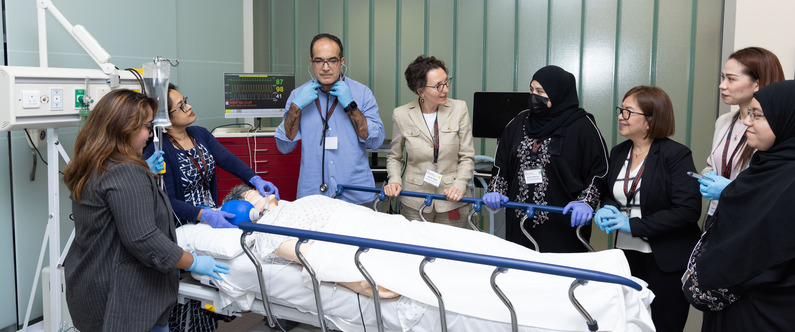WCM-Q course promotes simulation-based medical education
 Course participants practicing their skills on a manikin.
Course participants practicing their skills on a manikin.
With the rapidly growing role of simulation-based education (SBE) in healthcare, there is an increased need for health professionals to train in the subject. Weill Cornell Medicine-Qatar (WCM-Q) held its second iteration of a unique faculty development course offering clinicians and educators an opportunity to learn how to utilize simulation-based education effectively. The inaugural course was held in 2022.
Simulation-based learning is increasingly employed as an invaluable educational methodology in health education. SBE, when delivered effectively, offers learners the opportunity to gain essential knowledge, skills, and attitudes which are critical to their ability to provide safe and effective patient care. Learners practice skills in recreated real-world scenarios and are supported during the debriefing conversation by trained facilitators to reflect upon, analyze, and gain a deeper understanding of the risks and benefits of observed behaviors.
Trained simulation educators utilize a three-step approach: pre-brief, the simulation and debrief, and stride to maintain psychological safety throughout the entire process so that learners can practice outside their comfort zone, thereby gaining invaluable insight into any gaps in their knowledge and practice.
 Simulation-based educational practice is aligned with the Healthcare Simulation Standards of Best Practice and is grounded by Kolb’s experiential learning theory and Knowles’ Adult Learning Theory.
Simulation-based educational practice is aligned with the Healthcare Simulation Standards of Best Practice and is grounded by Kolb’s experiential learning theory and Knowles’ Adult Learning Theory.
Based on the activity’s learning objectives, a scenario is crafted, and the simulation is delivered using any one or a combination of modalities that best meet the needs of the activity. There is a wide range of modalities, including human role players or simulated participants (SPs), manikins and part-task trainers, and virtual, mixed, and augmented reality, all of which are operated using a varying degree of technological assistance.
Titled “Simulation Educator Course: Designing and Debriefing Effective Simulations,” the two-day course enabled participants to describe the theoretical foundations of healthcare simulation; apply methods for designing effective simulation scenarios; describe and apply effective techniques for debriefing that engage learners, promote reflection, and mitigate frustration; and provide debriefing feedback to peers using formal and informal processes.
The course was aimed at physicians, nurses, pharmacists, allied health professionals, healthcare simulation professionals, and educators.
The course was designed by WCM-Q in collaboration with Dr. Michelle Brown, associate professor in the Department of Health Services Administration at the University of Alabama at Birmingham and founding program director of the healthcare simulation master’s degree.
Course speakers included Dr. Brown and WCM-Q’s Dr. Stella Major, associate professor of family medicine in clinical medicine and director of the Clinical Skills and Simulation Lab (CSSL), a state-of-the-art clinical skills and simulation center; Joshua Vognsen, simulation education specialist and member of CSSL; and Rudy Bahri, manager of CSSL.
Dr. Major said: “The course aims to equip healthcare educators with the necessary skills to deliver effective simulations based on best practice standards. I am delighted that data from our post-course evaluation survey confirmed that participants did indeed demonstrate increased knowledge and self-reported confidence across all domains under study. I am confident that with this type of professional support, we will continue to see an increase in the use of simulations as part of both training and patient care.”
The course was designed in 2022 after a competitive CPD (continuing professional development) grant was awarded. To further complement the learning experience, the second iteration of the course offered participants additional time to practice the new skills they had acquired. The course will be offered annually at WCM-Q as part of the CPD program.
In Qatar, WCM-Q is accredited as a provider of continuing medical education by the Department of Healthcare Professions (DHP) of the Ministry of Public Health (MoPH) and is accredited internationally by the Accreditation Council for Continuing Medical Education (ACCME).